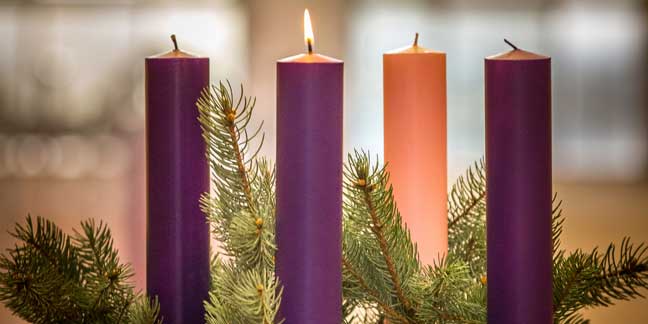Today in the celebration of the Eucharist there’s a change of vestment colors to celebrate a change of season. It’s not just that the weather is getting colder: today we begin a new season in the liturgical year and a new liturgical year. We begin Advent. “Advent” means “coming.” Last Sunday we celebrated the future Second Coming of Christ; during Advent we prepare to celebrate the First Coming of Christ: at Christmas, or, to be more technical, at the Annunciation, when through the Holy Spirit he was conceived in Mary’s womb (also called the Feast of the Incarnation), but he was born at Christmas, which is also called the Feast of the Nativity. In Advent we celebrate the start of salvation history, when man was lost in the darkness of sin before Christ’s First Coming to earth at Christmas.
In today’s First Reading Isaiah prophesies the coming of the Messiah as time of peace and blessings for all nations forever – that is cause for rejoicing, which is why Advent is a time for rejoicing. Isaiah’s prophecy began to be fulfilled in the First Coming, when the Savior of the World was born, and will be fulfilled in the Second. Isaiah today envisions people coming from all over the world to the mountain of the Lord’s house (Mt. Zion in Jerusalem) to be instructed by the Lord himself. The Lord will bring peace and light to guide us. He is the true light that enlightens everyone (cf. John 1:9).
In the First Coming and the Second Coming Christ is not letting us go it alone. When St. Paul in the Second Reading today reminds us that “our salvation is nearer now that we first believed,” he’s reminding us that Christ is nearer to us now because he is one of us. God became man. At Christmas we’ll be celebrating the fact that God is with us as one of us. We have to do our part, we have to change our lives, but shielded by the “armor of light,” “putting on the Lord Jesus Christ,” as St. Paul encourages us to do: by living a Christian life we are helping Christ to fulfill that prophecy of Isaiah.
In today’s Gospel Jesus is speaking about his Second Coming, but the question for both the First Coming and the Second Coming of Christ is the same: How are you getting ready? Your answer to that question will influence how you live Advent. Is it “finally!”? Is it “yeah, right…”? Is it “yikes”? Those answers are not answers to what gifts you’re going to get, what family you’re going to see, or how much you’re going to eat: they’re answers to how you are getting ready for Christ’s coming at Christmas. The Second Reading and the Gospel today remind us that he is coming at an unexpected moment. For the Israelites that was nothing new, but what they didn’t imagine was that the Messiah, the Savior of the World, would come in such an unexpected way: as a little baby in a manger. What’s your response to the Savior of the World coming as a little baby and lying in a manger? Maybe the question “Are you getting ready?” takes on a different light when you consider how he is coming. For the Israelites, the coming of the Messiah was going to be at the end of time: he was coming to defeat all their enemies and clean house. Instead he came as a little baby, way ahead of schedule. How did they respond? Some saw a little baby in a manger and said, “he’s not the Messiah, come on….” Others didn’t even believe in a Messiah to begin with, and didn’t change their opinion: “yeah, sure, the Savior of the World…right.” Christians are often on the fence: Some have the same attitude as the Israelites and the skeptics, but others are saying, “yikes,” because the Second Coming is all they have on their mind, and they know they’re not ready. Advent is a time to get ready the real Christian way, just as today’s Psalm says: “Let us go rejoicing!” Rejoicing is the Christian way to respond to the question Jesus is asking in the Gospel today.
Four weeks makes Christmas seem a long way away, but it will come quicker than you expect. Take some time in prayer this week to draft your spiritual plan for Advent. Not your plan for breaking out the ornaments, getting the tree, or do your shopping. Your spiritual plan. How are you going to use Advent to prepare spiritually for Christmas? Once you’ve made your plan, make a family plan too.
Readings: Isaiah 2:1–5; Psalm 122:1–9; Romans 13:11–14; Matthew 24:37–44. See also 1st Sunday in Advent, Cycle A and 21st Week in Ordinary Time, Thursday.




